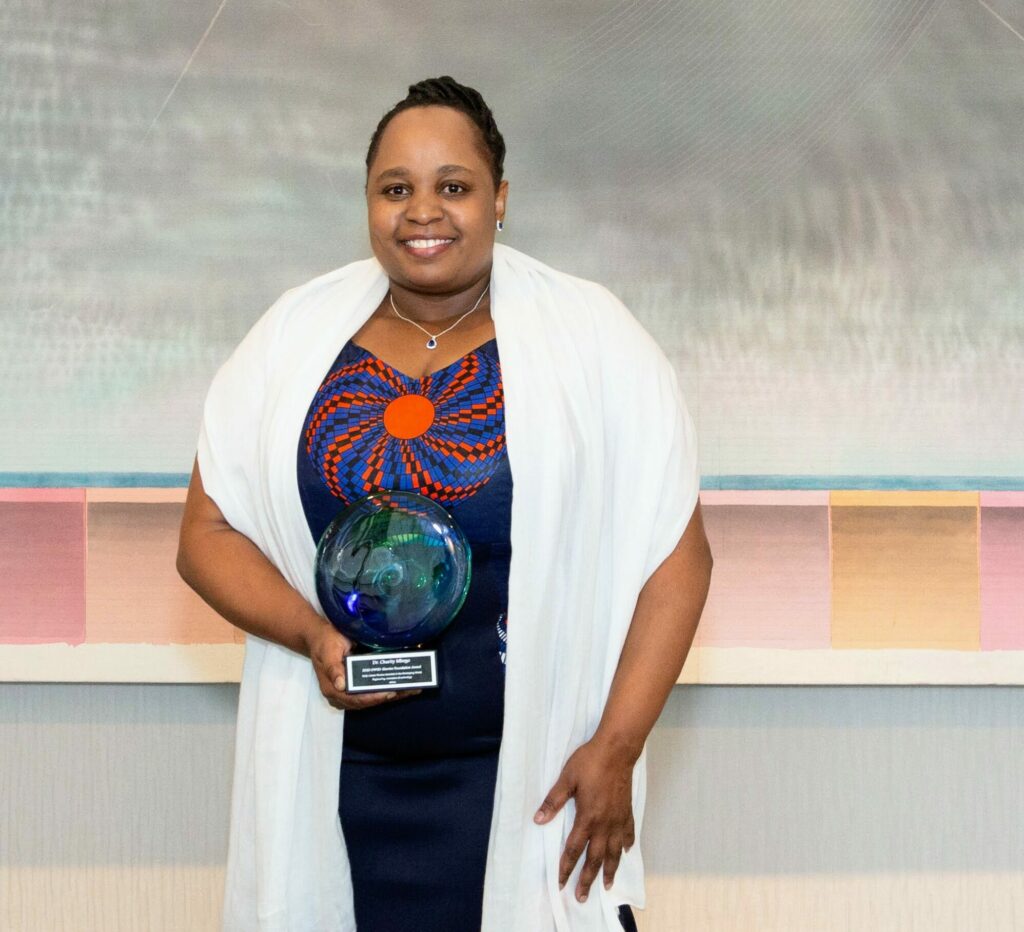By Layih Butake and Szymon Jagiello
Next Einstein Forum: Could you please tell us how and why you decided to embark upon a career in the science field?
Chao Mbogo: I did not know that I wanted a career in computer science until I decided to pursue a degree in mathematics and computer science when I was 17. Before that, I had never met a computer scientist. By being introduced to computing during my undergraduate degree, I grew to love computer programming, which inspired my decision to pursue a computer science career. My father was a lecturer at a teachers’ college, so I think the urge to become a teacher may have come naturally. I was working as a teaching assistant when I decided to pursue a career in academia. Later, when I started a PhD in computer science at the University of Cape Town, I realized how much research and innovation are intertwined. Through my doctoral journey, I was inspired to increase my impact in innovation; thus, I consider myself a computer scientist who is a researcher, educator and mentor.
Is there anything you wish you knew about science before you got started?
C.M.: No. I am glad that I started out in computer science, completely naive of what it entails. However, I am naturally curious, which nurtured the learning process, even from the inexperience with which I started.
You are currently the Dean of the School of Science and Technology at the Kenya Methodist University. Tell us more about your job?
C.M.: I lead a school with four departments: Computer Science, Information Science, Agriculture and Natural Resources, and Pure and Applied Sciences. The school hosts nearly 1,000 students and over 20 full-time faculty staff. In addition to the managerial roles of contributing to the University Senate and Academic Boards, my most important duties are two-fold: providing mentorship to the students and offering structured guidance to the four departments. Through this mentorship, three female students from the Department of Computer Science have won international scholarships to attend the Grace Hopper Conference. Further, the school has seen an increase in the postgraduate student output, both in numbers of graduating students and quality, as the school’s postgraduate administrative processes are centrally managed from the Dean’s office. In offering structured guidance to departments, the Dean’s office takes the lead in utilizing technology to guide fast and trackable work output.
What are the toughest situations you have found yourself in as a researcher? What lessons have you learned from these experiences?
C.M.: One of the biggest challenges I have faced as an African researcher is the inability to produce research output consistently. This is partly due to limited avenues for relevant funding and increased workload. To overcome this challenge and maintain research relevance, I have taken different approaches like using my teaching as a research opportunity. Thankfully, my research interests directly relate to learning within and outside the classroom, so it has been convenient to engage students in my research activities. Furthermore, I get involved in international and local research platforms. For instance, I have been a reviewer for the Annual Conference on Innovation and Technology in Computer Science Education (ITiCSE).
Which project achievement are you most proud of? Why?
C.M.: I am most proud of my work in designing learning environments for students in resource-constrained settings. Specifically, my work seeks to support the learning of computer programming using mobile phones while addressing the limitations of mobile phones and learners’ needs. I am proud of the work because of its potential impact in enabling learners to use a device to learn computer programming in a step-by-step manner practically. The project also allows me to work with experts in education and user-interface design. For example, I am currently working with Nairobi-based user-interface designer Mwaniki Nyaga to re-design a mobile application by focusing on visual programming towards supporting the learning of computer programming on mobile phones. The potential of this project was recognized in a 2017 Quarts Africa Innovators list.
For the foreseeable future, sound programming skills will be crucial in STEM subjects, especially at a foundation level. As long as this situation persists and students’ access to mobile phones and tablets grows, the techniques developed through this project could offer a smart solution that allows the continent to keep producing young programmers.
What is your advice for young Africans who want to follow a path in STEM?
C.M.: Strengthen your personal and professional skills to excel in STEM. To succeed in STEM, you cannot focus on technical skills alone. For example, learning how to communicate your science through public speaking and professional writing will enable you to explain your technical work to mixed audiences, experts, and non-experts. Learning how to write winning applications for grants and scholarships will open doors for expanding your training or networks.
Mentorship is a crucial element to inspire young generations and drive them to STEM. Is this the reason why you founded KamiLimu?
C.M.: Yes. While we train students on technical skills in the classroom, many 21st-century skills may not necessarily fit snugly within the curricula or be explored in-depth. In 2016, I conducted a survey among students in four universities to understand their needs in mentorship. The results indicated that university students need mentorship in personal skills such as self-confidence and professional development skills such as preparing for job interviews, innovation skills, writing winning scholarship applications, and community engagement. These formed the foundation leading to the mentorship program that complements classroom learning for university students.
KamiLimu offers structured, need-based, consistent, and measured mentorship within an 8-month program. So far, we have served 169 students from 19 Kenyan universities and have worked with 95 industry professionals and 19 organizations to offer mentorship.

